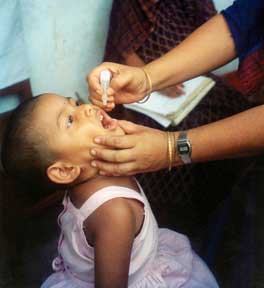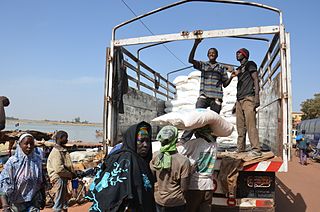Related Research Articles

Médecins Sans Frontières, also known as Doctors Without Borders, is a charity that provides humanitarian medical care. It is a non-governmental organisation (NGO) of French origin known for its projects in conflict zones and in countries affected by endemic diseases. The organisation provides care for diabetes, drug-resistant infections, HIV/AIDS, hepatitis C, tropical and neglected diseases, tuberculosis, vaccines and COVID-19. In 2019, the charity was active in 70 countries with over 35,000 personnel; mostly local doctors, nurses and other medical professionals, logistical experts, water and sanitation engineers, and administrators. Private donors provide about 90% of the organisation's funding, while corporate donations provide the rest, giving MSF an annual budget of approximately US$1.63 billion.

Polio vaccines are vaccines used to prevent poliomyelitis (polio). Two types are used: an inactivated poliovirus given by injection (IPV) and a weakened poliovirus given by mouth (OPV). The World Health Organization (WHO) recommends all children be fully vaccinated against polio. The two vaccines have eliminated polio from most of the world, and reduced the number of cases reported each year from an estimated 350,000 in 1988 to 33 in 2018.
The Save the Children Fund, commonly known as Save the Children, is an international, non-governmental organization. It was founded in the UK in 1919, with the goal of helping improve the lives of children worldwide.
The oral polio vaccine (OPV) AIDS hypothesis is a now-discredited hypothesis that the AIDS pandemic originated from live polio vaccines prepared in chimpanzee tissue cultures, accidentally contaminated with simian immunodeficiency virus and then administered to up to one million Africans between 1957 and 1960 in experimental mass vaccination campaigns.
Vaccination and religion have interrelations of varying kinds. No major religion prohibits vaccinations, and some consider it an obligation because of the potential to save lives. However, some people cite religious adherence as a basis for opting to forego vaccinating themselves or their children. Many such objections are pretextual: in Australia, anti-vaccinationists founded the Church of Conscious Living, a "fake church", leading to religious exemptions being removed in that country, and one US pastor was reported to offer vaccine exemptions in exchange for online membership of his church.

Project HOPE is an international global health and humanitarian aid non-governmental organization founded in the United States in 1958. Project HOPE works in five main areas: disasters and health crises; infectious diseases; noncommunicable diseases; maternal, neonatal and child health; and health policy. The organization has been led by President and CEO Rabih Torbay since 2019.

Polio eradication, the permanent global cessation of circulation of the poliovirus and hence elimination of the poliomyelitis (polio) it causes, is the aim of a multinational public health effort begun in 1988, led by the World Health Organization (WHO), the United Nations Children's Fund (UNICEF) and the Rotary Foundation. These organizations, along with the U.S. Centers for Disease Control and Prevention (CDC) and The Gates Foundation, have spearheaded the campaign through the Global Polio Eradication Initiative (GPEI). Successful eradication of infectious diseases has been achieved twice before, with smallpox in humans and rinderpest in ruminants.
A public health intervention is any effort or policy that attempts to improve mental and physical health on a population level. Public health interventions may be run by a variety of organizations, including governmental health departments and non-governmental organizations (NGOs). Common types of interventions include screening programs, vaccination, food and water supplementation, and health promotion. Common issues that are the subject of public health interventions include obesity, drug, tobacco, and alcohol use, and the spread of infectious disease, e.g. HIV.
Health in Afghanistan remains poor but steadily improving. It has been negatively affected by the nation's environmental issues and the decades of war since 1978. The Ministry of Public Health (MoPH) oversees all matters concerning the health of the country's residents. The Human Rights Measurement Initiative finds that Afghanistan is fulfilling 72.5% of what it should be fulfilling for the right to health based on its level of income.

Mali, one of the world's poorest nations, is greatly affected by poverty, malnutrition, epidemics, and inadequate hygiene and sanitation. Mali's health and development indicators rank among the worst in the world, with little improvement over the last 20 years. Progress is impeded by Mali's poverty and by a lack of physicians. The 2012 conflict in northern Mali exacerbated difficulties in delivering health services to refugees living in the north. With a landlocked, agricultural-based economy, Mali is highly vulnerable to climate change. A catastrophic harvest in 2023 together with escalations in armed conflict have exacerbated food insecurity in Northern and Central Mali.
The Center for Infectious Disease Research and Policy (CIDRAP) is a center within the University of Minnesota that focuses on addressing public health preparedness and emerging infectious disease response. It was founded in 2001 by Dr. Michael Osterholm, in order to "prevent illness and death from infectious diseases through epidemiological research and rapid translation of scientific information into real-world practical applications and solutions". It is not part of the Center for Disease Control or National Institute of Health.

Health in Angola is rated among the worst in the world.

Health in South Africa touches on various aspects of health including the infectious diseases, Nutrition, Mental Health and Maternal care.
Pakistan is one of the two remaining countries in the world where poliomyelitis (polio) is still categorized as an endemic viral infection, the other one being Afghanistan. While it has yet to fully eradicate Polio, there has been a downwards trend in the number of reported cases per year; the total count of wild poliovirus cases in Pakistan in 2019 was 147, compared to 84 in 2020, 1 in 2021, 20 in 2022, 6 in 2023 and 2 to date in 2024.
The United States Intelligence Community (IC) has a long history of producing assessments on infectious diseases. Most of these papers are distributed to government administrators and inform the choices of policymakers. Three of these assessments stand out as analytical products that have had important impact on the awareness, funding and treatment of infectious diseases around the world. The first paper is the National Intelligence Estimate on the Global Infectious Disease Threat, the second paper is the assessment on the Next Wave of HIV/AIDS, and the third paper was the assessment on SARS. This page summarizes the findings of these three papers and provides information about their impact.
The Office of U.S. Foreign Disaster Assistance (OFDA) was an organizational unit within the United States Agency for International Development (USAID) charged by the President of the United States with directing and coordinating international United States government disaster assistance. USAID merged the former offices of OFDA and Food for Peace (FFP) in 2020 to form the Bureau for Humanitarian Assistance (BHA).
This page is a timeline of global health, including major conferences, interventions, cures, and crises.
Yvonne "Bonnie" Maldonado is an American physician, pediatrician, and Professor of Pediatrics and of Health Research and Policy at Stanford University, with a focus on Infectious Diseases. She founded Stanford's pediatric HIV Clinic and now serves as Stanford University School of Medicine's Senior Associate Dean of Faculty Development and Diversity.
The World Health Organization (WHO) created the Global Commission for the Certification of the Eradication of Poliomyelitis in 1995 to independently verify the eradication of wild poliovirus. The GCC certified the worldwide eradication of indigenous wild poliovirus type 2 on 20 September 2015, and wild poliovirus type 3 on 17 October 2019. In addition, five of the six World Health Organization Regions certified their status as free of indigenous transmission of all three serotypes of wild poliovirus :
David Alain Wohl is an American infectious disease physician. During the COVID-19 pandemic, he was among those leading UNC's response to the SARS-CoV-2 pandemic. Wohl was appointed the Medical Director of the COVID Vaccination Clinic at UNC Hospitals Hillsborough Campus and led COVID-19 treatment clinical trials at UNC School of Medicine.
References
- ↑ National Intelligence Estimate 99-17D: The Global Infectious Disease Threat and Its Implications for the United States (PDF), January 2000
- ↑ Intelligence Community Assessment 2002-04D: The Next Wave of HIV AIDS (PDF), July 2002
- ↑ Intelligence Community Assessment 2003-09 SARS Down but Still a Threat (PDF), August 2003
- ↑ Chelsea Conaboy (February 28, 2013). "Boston physician: CIA's vaccination scheme in Pakistan undermined global public health efforts". Boston.com.
- ↑ Maryn McKenna (23 May 2012). "Update: Pakistan, Polio, Fake Vaccines And The CIA". WIRED.
- 1 2 "Regional Highlights". cia.gov. May 2, 2007. Archived from the original on June 13, 2007.
